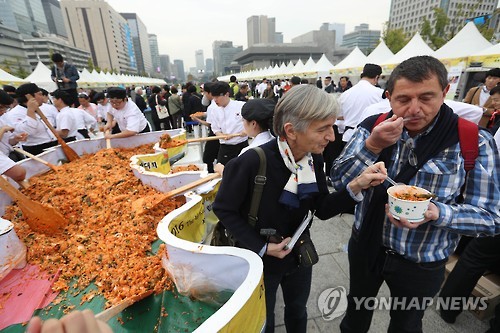ID :
422043
Fri, 10/28/2016 - 03:34
Auther :
Shortlink :
https://oananews.org//node/422043
The shortlink copeid
Korean food envoy says 'synergy' reason for co-hosting annual festival

By Shim Sun-ah
SEOUL, Oct. 27 (Yonhap) -- The chief of the state-run Korean food promotional body on Thursday called for concerted efforts by the government and the food industry to promote Korean food, known as "hansik," on the global culinary scene.
"I think the government, public and civilian organizations should work together to promote the Korean culinary culture so they can bring about a synergy effect," Yoon Sook-ja, chief of the Korean Food Foundation, said during an interview with Yonhap News Agency on Thursday. "The government's role should be limited to providing help."
From this year, the foundation is co-hosting the annual Korean Food Day Festival with the Korean Food Association, an industry group. The festival has been held by the association every fall since 2013 at Gwanghwamun Plaza in downtown Seoul to offer both locals and foreigners more chances to enjoy healthy and nutritious food.
On display during the 4th edition were hundreds of traditional Korean dishes ranging from royal court cuisine to temple dishes, beverages, desserts and traditional food ingredients.
In addition to the exhibition of Korean dishes, there was a "performance" to cook a huge bowl of "bibimbap" -- a traditional Korean dish of rice and vegetables -- a fashion show of uniforms for Korean food chefs, a cooking competition of cookery school students, and Korean rice cake-making and sampling events for visitors. The two-day festival ended on Thursday.
Although the festival's name includes "Korean Food Day," it is not currently an official commemorative day in South Korea, despite all the efforts underway to create one under a civilian initiative.
"It's sad that we have so many commemorative days -- even Vegetable Day -- but don't have Korean Food Day," Yoon said, adding that her foundation plans to declare an unofficial date some time before the Chuseok holiday, the Korean Thanksgiving Day which falls on Aug. 15 on the lunar calendar.
The purpose is to remind people of the value of hansik "at least once a year," she said. "Koreans don't realize how good their local food is in the same way that they tend to neglect their family (without realizing its importance)."
With the global spread of Korean pop culture, the local cuisine has recently drawn unprecedented attention around the world for its health benefits.
On the first day, organizers made bibimbap in a huge bowl created in the shape of the Korean Peninsula and shared the food with about 1,000 participants and visitors. But the festival did not draw the kind of attention its organizers hoped for due to a lack of equipment that could be used to prepare and sample the various dishes.
"We wanted to cook and serve at least kimchi pancakes to visitors but couldn't because any use of fire is strictly forbidden in the area," she said. "I'm thinking of moving the venue to somewhere else other than Gwanghwamun next time."
The 68-year-old has enjoyed probably the busiest months of her life after taking office as the fourth chief of the foundation in early April.
Yoon worked for 20 years as a college professor of traditional cookery and is now the founder and head of the private Institute of Traditional Korean Food. She is also the author of more than 50 cookbooks, including "The Beauty of Korean Food: With 100 Best-Loved Recipes" published in eight languages with government support.
As foundation chief, she has strived to upgrade the quality of Korean restaurants and promote food tourism for travelers to help them return home with a strong impression of Korean culinary culture. She led a campaign to encourage Korean restaurants at home and abroad to use the correct English, Japanese or Chinese names for local cuisines and developed a top 10 modern Korean menu for foreigners coming to the 2018 PyeongChang Winter Olympics.
The foundation also launched a 12-week education program to help struggling Korean restaurant owners develop new menus, including traditional alcoholic drinks, this year with support from two food industry groups. The first group of 19 people from three provinces benefited from the program on a trial basis, according to her.
"With the recent passage of a law allowing the operation of small-scale breweries with a government license, we recommended them to make traditional alcoholic drinks and serve them with Korean dishes that might go well with them."
Outside the country, the foundation hosted events for promoting Korean food in various festivals; providing Korean cookery education to professors, restaurant owners and hotel chefs; and distributing useful market information to domestic food-service operators looking to go abroad.
The foundation, meanwhile, plans to pay greater attention to the local food industry, as traditional food is becoming less popular among younger Koreans, she said. "We're going to shift our focus to domestic promotional activities and food tourism starting next year."
Her next goal is adding the country's traditional annual practice of making "jang" to UNESCO's Intangible Cultural Heritage of Humanity List in cooperation with the local food community.
In 2013, the annual practice of making kimchi before winter, known as "gimjang," was added to the list. "Jang," or traditional fermented soybean sauce, includes "ganjang," or soybean sauce, "gochujang," or red pepper paste and "doenjang," or soybean paste.
"Every January, Korean mothers used to make doenjang, ganjang and gochujang with previously prepared salt and fermented soybean lumps for use in the following year. That was one of the two most important annual family practices along with gimjang," Yoon said.
While other Asian countries have traditional fermented sauces made from fish, wheat or barley, Korea is the only nation in the world whose people make fermented sauces from soybeans, she stressed.
sshim@yna.co.kr
(END)





